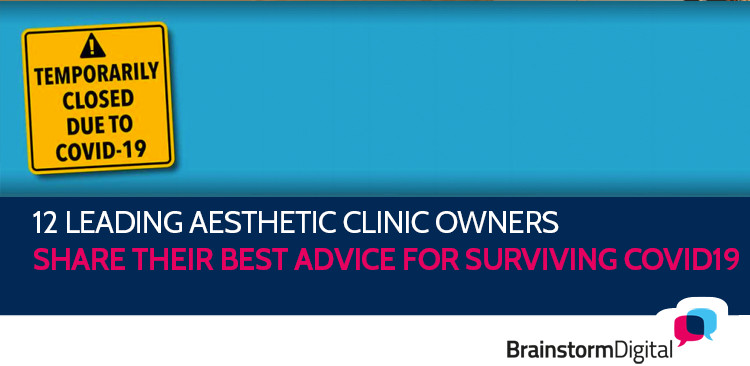
How can your clinic survive the Coronavirus crisis?
Not every clinic or med spa is going to make it through this challenging period.
Those that do are not taking a “wait and see” attitude.
Their owners are working hard to help their businesses stay afloat without income or patients.
And – crucially – they are using this time strategically, to ensure that when they are able to re-open, they are as strong and as viable as possible.
So what are their secrets?
We’ve spoken to 12 clinic and med spa owners from three continents, to find out exactly what steps they are taking to survive the Coronavirus crisis – and even give themselves a competitive advantage in the future.
Here’s what they had to say….
1. Be agile – Be prepared to pivot
In every crisis there are also opportunities.
And for aesthetic clinics, this may mean looking out for new markets and new treatments during the Coronavirus period.
“A few weeks ago, I noticed an influx of brides who are supposed to get married in July and were left high-and-dry in terms of their skincare treatments,” says Dija Ayodele, CEO of Westroom Aesthetics in London and founder of the Black Skin Directory. “I gave them a free consultation and sent them some products which will get them closer to where they want to be.”
But she didn’t stop there. Once she had identified the opportunity, she started actively marketing to this market – in a very personal way.
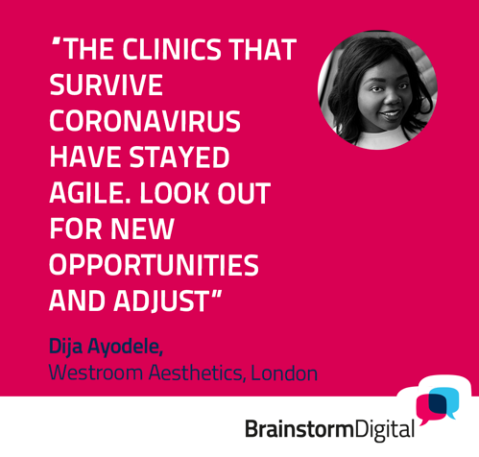
“I put a picture of myself on Instagram preparing for my wedding, talked about what my skin looked like at that time, and really empathized with people who want great skin for their wedding but feel like they’re missing out because of COVID-19.
“This really resonated and I had 5 brides approach me! They bought loads of products and were grateful for the help, and hopefully they’ll come into the clinic once it’s possible.”
The key to this approach is being agile. “You have to keep your eyes out and notice trends,” says Dija. “There are always opportunities, but you have to be thinking about them the whole time – and be prepared to act fast.”
2. Sell products with Facebook Live and virtual events
Haley Wood, owner of The Look Facial Aesthetic in Tennessee, knew she had to develop new income streams while her clinic was closed.
She started by creating glam kits with products like gentle peels and “hand towels we don’t usually sell”, and was surprised when they “sold like hotcakes”.
But then a skincare rep suggested selling the kits through a Facebook Live event – and the new income stream really took off.
They promoted the session heavily on email and social media, encouraging their followers to log in and tag a friend.
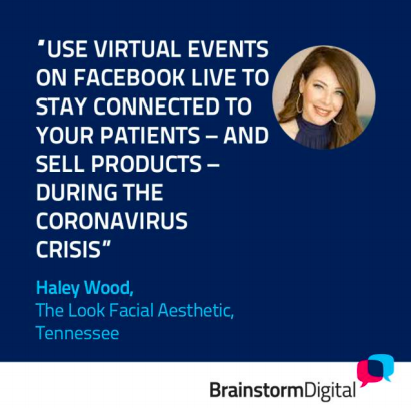
And it was immediately successful. Between 600-1,000 people viewed the live event at any one time. The aesthetician and the skincare rep demonstrated various acne, skin brightening and peel products, which they sold in a choice of kits.
Viewers sent in their orders over the phone, over Facebook, over email and even over Instagram.
“It was like an open evening, but we did it online,” says Haley. “People are at home, home-schooling their kids, and they need a break, so they’re happy to come to our event.”
She has now made the virtual event a weekly occurrence, with different themes.
“We’re planning to do one which is just a party, where I’ll answer questions. I’m hoping to get patients signed up for virtual consultations, so we can line up patients for when we re-open.
“It’s trial-and-error,” she concludes, “but you have nothing to lose!”
3. Serve patients with virtual consultations
Dr Shobhan Manoharan, owner of Brisbane Skin, a chain of dermatology and aesthetic clinics in Western Australia, has been using virtual consultations for the past 12 years.
“Previously we used it for patients in rural areas, or interstate or overseas. But since the Coronavirus crisis began, and we have had to shut down the cosmetic side of our business, it’s come full circle as a medical tool, and we’re using it to reach everyone interested in aesthetic procedures.”
He’s found that while there is a group of patients who only want to be seen in person, there are plenty of others who “have spare time on their hands, and see this as their opportunity to explore, understand and research a range of aesthetic procedures. They are happy to do a teleconsult.”

Dr Manoharan treats the virtual consultation much as you would an in-person consult, but there are some key differences.
“You need to get as much information as possible from the patient before you meet them online, including as many quality photos as possible, taken from various angles under appropriate lighting, because there can be a lot of shadows on video.
“And you need as much medical history in advance as possible to streamline the consults.”
This means that the workflow is potentially greater than for consultations in-clinic.
“You need to get the right photos, some might not be good, some patients are not tech savvy and might need more hand-holding. You need to train your staff to handle this and to develop a very streamlined process.”
Ultimately the goal is to line up patients for treatments once the lockdown is lifted.
One difficulty, says Dr Sheena Kong, owner of a leading med spa in San Francisco, is that without a firm date for that happening, it is difficult to get a firm commitment from patients on virtual consultations to book a treatment.
“The patient gets what they need from the consultation – a good treatment plan – but from a business perspective, we need conversions.
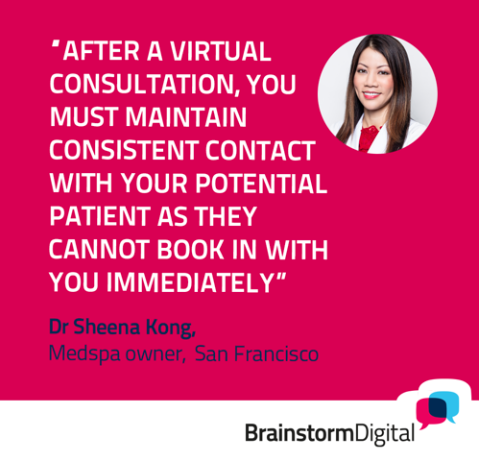
“We put them on a waiting list, but the key is to maintain contact with them consistently after the virtual consultation, so once you re-open they will be ready to go ahead.
“Developing a good connection with that potential patient is very important.”
Others ask for small deposits to secure a treatment slot, once the clinic re-opens.
Dr Joseph Hkeik, owner of the All Saints chain of clinics in Sydney, Australia, takes a different approach to virtual consultations. He sees it less as a sales tool for new patients, and more as an opportunity to connect to his existing patients and care for their emotional wellbeing.
“I grew up in Lebanon during the war, I know that the last thing people want is to be sold to at times like this. They want to be reached out and connected to.
“Of course we do an assessment and help them with their skin, but I also use the opportunity to tell them it’s okay not to be perfect right now – even though I’m a perfectionist! I don’t want people to be distressed because of wrinkles.
“We help them prioritize their concerns, and plan for the future so they have something to look forward to.
“It re-enforces our relationship with the client and keeps us connected. This is not a time to do new business – it’s about connections.”
4. Ramp up your marketing
It seems counter-intuitive to increase your marketing while your clinic is closed, but keeping a high profile is key to surviving this period.
“The strong will survive this, while weaker practices will lose out to the competition,” says Dr Manoharan in Australia. “We don’t want to be quiet right now – we want to keep ourselves at the forefront of people’s minds. That means being solid and prominent throughout this crisis.”
His chain of practices have boosted their marketing since the Coronavirus shut-down began.
“We have a number of teams putting projects together, to get more visibility and engagement,” he says.
“We are doing more on social media, increasing online product sales and putting out more information on that, and even offering skin seminars online. There is an opportunity to reach people while they are at home.”
They are still promoting their aesthetic treatments, even if they are not offering them right now.
“We can still educate people, promote virtual consultations and get organized so that when the clinics are receiving aesthetic patients again, we’re ready.”
Editor’s note: Maintaining your existing patient base, and continuing to market to new leads, is crucial to re-opening your clinic smoothly and easily.
Inbox Express is a library of marketing emails you can use to stay in touch with your patients during the Coronavirus crisis – and get them back through your doors once the crisis is over.
The emails in Inbox Express are designed to make your marketing easy.
They are written for you and require very little customization, so they take just 2-3 minutes to send. But they have a powerful impact on your relationship with your patients and can help generate income at this crucial time.
To find out more about Inbox Express, just click here now.
5. Reach out to existing patients individually
Some clinics are not just increasing their marketing, but reaching out to their existing patients on an individual basis.
“I know them all well enough to really personalize the messaging – I can ask how their recent job interview went or just ask whether they need to chat,” says Dija Ayodele in the UK. “It keeps the relationship going.”
Melissa Haloossim, owner of Skin Thesis in West Hollywood, takes a similar approach, but she has had better responses texting people – even those she was not previously in personal contact with.

“I tell them I just want to check everything’s ok and see how their family is doing, and they respond! They appreciate you reaching out and checking in.”
Deb Farnworth-Wood grew the AustralianSkin Clinics franchise to over 60 locations before selling, and now operates the Ultimate Skin & Body Clinic.
Her clinic has contacted one particular sub-set of patients: Those who have paid in advance for treatments.
“They need reassurance that their payments will be honoured,” she says.
6. Stay in touch with your staff
Staying in touch with patients is key – but so is staying in touch with your staff, if they have been furloughed or put on any kind of leave.
“You need to keep up morale, and it’s important that they feel support from you,” says Mina Grasso, founder of Allure Image Enhancementin California.
Even simple touchpoints work.
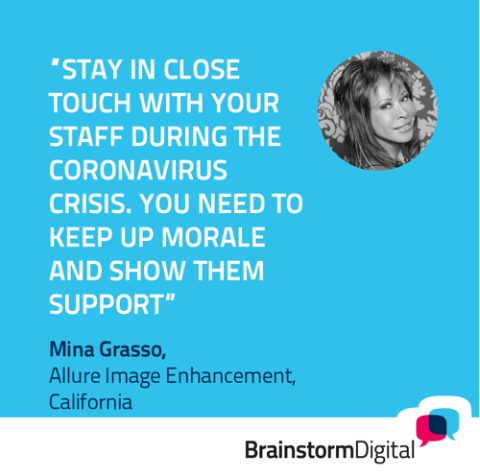
“We use a messaging app and text each other the whole time. They really appreciate it because it’s a way for everyone to touch base.
“But I also look for fun ways to engage them. For example, I found myself pulling weeds in the garden, so I posted a picture and asked everyone to post pictures of their latest home projects too – which they did!
“It was an easy way to maintain the group identity and friendships, and make sure they know we’re still going to be there when the crisis is over.”
“Your staff are wondering if they’re going to have to apply for unemployment,” agrees Haley Wood. “You have to stay in contact with them.”
She recommends being as honest as possible with them about your clinic’s financial situation.
“You need to have tough conversations about how long you can keep them on,” she says. “Even if you are healthy financially, there may be a time when you can’t continue paying them.
“We’ve had to talk to our staff about being more flexible when we re-open, perhaps taking on nights or weekends. We’ve also discussed potential changes in their job roles. Not only have they really appreciated the transparency, they have been really awesome about it.”
These conversations enable both them and you to plan ahead.
“You need to understand their plans and needs, as well,” says Haley. “For example, if you need more staff to work on the front lines but particular people don’t want to do that, you need to talk about it, to figure out where you can meet in the middle.”
7. Build your sales and marketing collateral
Use this unusual period of quiet to improve your ability to sell once you re-open, saysDeb Farnworth-Wood in Australia.
She has managed to maintain her staff part-time, as the Australian government is giving some salary assistance.
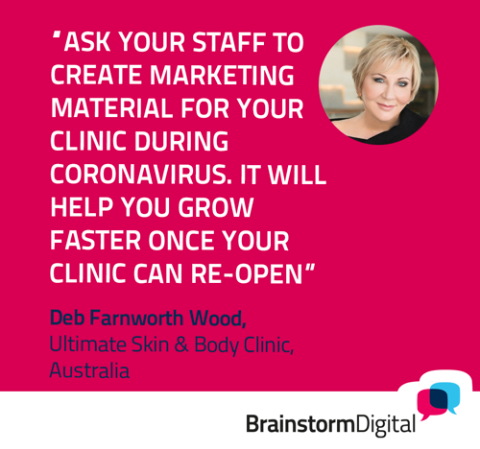
Since they cannot work in the clinic, she has asked them to boost the clinic’s marketing collateral and their own marketing and sales skills.
“They’re all writing blogs, how-to’s, and recording videos on how to look after your skin. We can use them now to stay top-of-mind with our patients, and having all this material will also help us get back on our feet faster once the clinic is open again.”
In addition, they are researching treatments which her clinic does not currently offer.
“We know all our own treatments inside out, but we don’t necessarily know what competitors have, and patients do sometimes ask! Having this information to hand will help them sell our own treatments better.
“It’s all research we would do anyway in an ad hoc manner, but right now we can do it in a structured way.”
8. Cut costs & proactively manage your finances
When you re-open your clinic, you may face a variety of financial pressures after operating without income – or with very little income – for months on end. Patients may also not be able to afford the same high-end treatments they could before.
So be prepared, and spend this time looking for cost savings.
“I review all my accounts every two years, but it makes sense to do this exercise now,” says Deb Farnworth-Wood in Australia. “I’m going through all my consumable costs and overheads, re-costing every treatment, looking at staff salaries and time spent.
“Prices are going to be driven down and margins are already tiny, so you need to look for any wins you can.”
For many clinics, this is not just anexercise togive an advantage in the future – it’s essential for survival right now.
“Like everyone we face enormous bills to be paid even while we’re closed,” says Haley Wood in Tennessee.
She has taken a structured approach to managing the clinic’s finances during this period, creating a 30-60-90 day financial plan.
This has included reviewing expenses, speaking to vendors to find out who can defer payments, and figuring out how to access government loans and other funds.
“This is very different to what I normally do, which is serving patients, but right now the priority has to be to figure out where your money is going, how to cut costs and how to get access to more finance. Many of the vendors will be flexible, provided you are in good standing.”
“The key is to be proactive about managing your finances right now,” agrees Dr Sheena Kong, who has taken many of the same steps as Haley Wood, including developing a medium-term financial plan, speaking to vendors and investigating government grants.
“Your priority has to be to preserve your cash, and to figure out your cash-flow at least three or four months ahead, because this could easily last that long. This may mean being a bit selfless, thinking carefully about your employees and perhaps even not paying yourself.
“Even when the ‘stay at home’ order is lifted, you might not be able to operate a fully booked clinic at once, for example if there are restrictions on the number of people who can be in the clinic at any one time. So plan your finances carefully right now.”
9. Update your skills
Dr Martin Kinsella, owner of Re-Enhance medical and dental clinic in Hale in the UK and one of the stars of hit TV show Real Housewives of Cheshire, is using this time to gain new knowledge and skills.
“I’ve been working towards an anti-aging functional medicine fellowship in the States for a long time, and it’s a lot of time to put in – there are many lectures and webinars and a lot of work.
During the Coronavirus crisis, he is spending between 3 and 4 hours each morning completing the fellowship.

“I’ve already learned so much I’ll bring to my practice,” he says.
The knowledge he has gained will help him diversify and expand the clinic’s offering – one of the factors he says is key to surviving a crisis like this.
Although his clinic cannot currently offer aesthetic treatments, they have been able to maintain a revenue stream by selling skincare products online and still take hormone orders on a daily basis.
Dr Ash Dutta, founder of Aesthetic Beauty Centre in the UK, is also using some of this time to take online training courses and attend industry webinars.
“As clinicians, it’s difficult right now because we can’t practice. We have to make sure we don’t de-skill ourselves. There are many online seminars being offered right now, so we should take advantage.”
Deb Farnworth-Wood, in Australia, is asking her staff to do the same. And there is one training course she is particularly keen for them to attend.
“I’ve just signed everyone up to do an online course in sales skills. One of the biggest problems in our industry is staff not valuing their abilities and not selling enough to the client, but selling is a skill that can be learned – so that’s what they’ll be doing!”
10. Create new services for the future
Ashley Hilmes, owner of Vega Vitality in Boston, doesn’t just want her staff to sell better…
…She also wants to give them better things to sell.
Her clinic is currently developing new packages for patients, “to make things better once we re-open.”
And she is also working on launching a new membership model, which will have several tiers.
“It’s all about finding new ways of retaining patients,” she says.
11. Streamline (and improve) your operations
This quiet time is the perfect opportunity to streamline your operations, so that when you re-open, your clinic or med spa operates more smoothly and efficiently.
“We’re finessing our systems,” says Ashley Hilmes in Boston.
“For example, we’re updating our consents, and also updating our policies. We’ve tried a lot of things over the years and found better ways of working, but the paperwork hasn’t necessarily been updated. This is our chance.”
Whilst this sounds like technical work, Ashley sees it as critical.
“When we re-open the workflow will be different, so it’s the perfect time to rethink these. Our spa is 5-years-old and we’ve grown a lot every year. Initially we had a start-up feel but now we’re moving onto the next phase, significantly professionalizing.
“Addressing policies and procedures up-levels the business, and makes us more appealing to high-end clients.”
Dr Chris Park, owner of Mobile Plastic & Reconstructive Surgery and Dermatology in Alabama, agrees.
Over the past few weeks, he has been handling much of the clinic’s correspondence and incoming phone calls himself, while staff are furloughed. And he’s been able to spend more time with patients on virtual consultations.
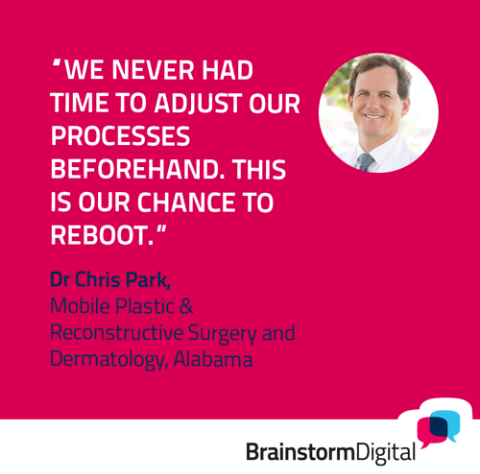
This has made him rethink the customer experience in his clinic during ‘normal’ times.
“Our practice was getting very big and busy, so the front desk was dealing with almost all calls and everyone else was running around full speed,” he says.
The current way of working feels more personal for patients – and the increased contact is more satisfying for him, he says.
So he is working on some new workflows which will enable some of this to be retained, once his practice is fully re-opened.
“We never had time to adjust our processes beforehand,” he says. “But this is our chance to reboot.”
For a downloadable version of this guide, click here.
Miriam Shaviv is creator of Inbox Express, the library of marketing emails for aesthetic clinics and med spas, designed to make your marketing effective and easy – including during the Coronavirus crisis! Find out more here.
She is Director of Content at Brainstorm Digital, which helps aesthetic clinics and med spas get patients through their doors again and again – without the headache of costly online advertising.






